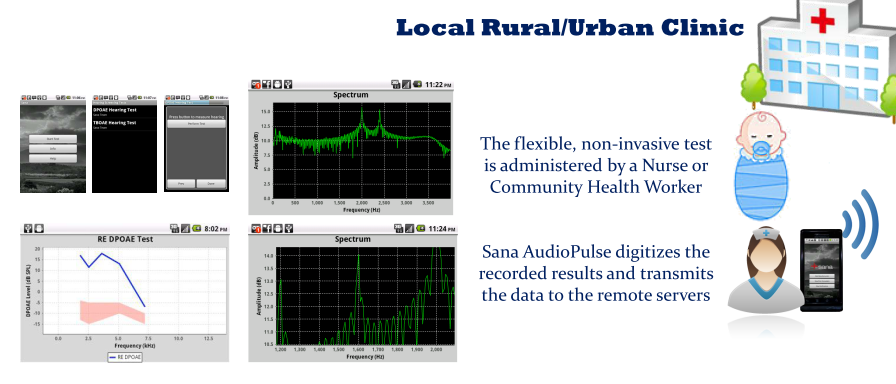While the World Health Organization (WHO) recommends audio screening for all newborns to avoid speech and language impairment complications later on, this is often not done due to financial restrictions, absence of qualified personel or other limitations.
While the World Health Organization (WHO) recommends audio screening for all newborns to avoid speech and language impairment complications later on, this is often not done due to financial restrictions, absence of qualified personel or other limitations.
Sana AudioPulse, developed by the Sana international team of students from MIT and the Computer Science and Artificial Intelligence Laboratory (CSAIL), Harvard, Northeastern and the Universidade Federal do Rio Grande do Norte (UFRN) in Brazil, allows healthcare personnel to screen for hearing loss with cellphones interfaced with specialized hardware. Data is then securely transmitted to a central database where a trained audiologist will analyze it and store it in an electronic medical record.
Dr. Ikaro Silva, a postdoctoral fellow at the Harvard-MIT Division of Health Sciences and Technology (HST), and a native of Brazil, conceived of the project during his research in audiology. He was interested in offering hearing loss screening capabilities to the rural areas of Brazil.
A quote from the MIT News explains:
“The Sana AudioPulse technology will remove the need for a trained audiologist to be on site for every screening by allowing users to employ the open-source Sana mobile platform. The test is simple to operate and utilizes a two-channel speaker and microphone that have been calibrated to perform a distortion product otoacoustic emission (DPOAE) test, a standard method for analyzing hearing. The device is hooked up to a mobile phone and a probe, which is inserted into the patient’s ear. The probe plays a stimulus into the patient’s ear and the response emitted back by the patient’s ear is recorded.

From this recording, which is uploaded onto a remote server, a trained audiologist can analyze the results to see if there is any evidence of hearing loss. By using a cellphone to send test results to off-site audiologists, the Sana AudioPulse team will be able to significant lower the cost and expand the accessibility of hearing tests, according to Silva.”
Sana AudioPlus recently won the prestigious GSMA Mobile Health Challenge award at the GSMA Health Alliance’s Mobile Health Summit in Cape Town, South Africa. During the challenge, teams of university students from around the world were asked to develop a mobile health concept that would address a specific healthcare need.
Sana program faculty advisor Peter Szolovits, a professor of electrical engineering and computer science and health sciences and technology and a CSAIL principal investigator complimented the team, saying, “The team’s victory is a tribute to the energy and intelligence of volunteers working on a challenging and important clinical problem motivated by the promise to improve health care through innovation.”
When I asked Kenneth Paik, a postdoctoral fellow in biomedical informatics at Harvard Medical School and the Laboratory of Computer Science at Massachusetts General Hospital and director of operations for Sana, about future plans, he said, “We will begin clinical studies at Boston Children’s hospital and university hospitals down in Brazil beginning in Dec/Jan.
We will keep track of Sana AudioPlus!
Watch this Sana AudioPulse demo video for more information:
[All images and videos in this post credited to Sana]
To read other posts in this exclusive ongoing series, please visit the Mobile Health Around the Globe main page. And if you have a Mobile Health Around the Globe story to tell, please post a comment below or email me at joan@socialmediatoday.com Thanks!